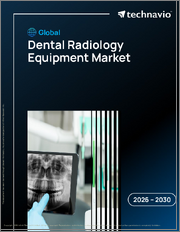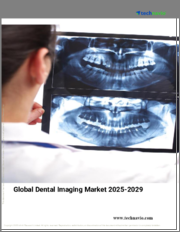
|
시장보고서
상품코드
1725207
구강 외 영상 시장 예측(-2030년) : 제품, 유형, 기술, 용도, 최종 사용자, 지역별 분석Extraoral Imaging Market Forecasts to 2030 - Global Analysis By Product, Type, Technology, Application, End User and By Geography |
||||||
Stratistics MRC에 따르면 세계의 구강 외 영상 시장은 2025년에 10억 3,610만 달러로 평가되었고, 2032년에는 19억 4,320만 달러에 이를 것으로 예측되며, 예측 기간 중의 CAGR은 9.4%로 성장할 전망입니다. 구강 외 영상은 입 밖에서 구강 및 악안면 부위의 이미지를 캡처하는 치과용 방사선 촬영 기술을 말합니다. 파노라마 X선 또는 콘빔 컴퓨터 단층 촬영(CBCT)과 같은 장치를 사용하여 진단 목적으로 치아, 턱 및 주변 구조를 시각화합니다. 이 방법은 치아 이상 감지, 교정 치료 계획, 뼈 구조 평가에 도움이 되며, 최소한의 방사선 노출로 상세한 비침습적 통찰력을 제공하여 치과 관리 및 치료 계획의 정확성을 향상시킵니다.
치과 및 치열 교정 사례 증가
전 세계적으로 치과 및 교정 사례의 증가는 구강 외 영상 시장의 성장을 이끄는 주요 요인 중 하나입니다. 구강 건강과 심미성에 대한 인식이 높아짐에 따라 교정기, 얼라이너 및 기타 치과 시술과 같은 교정 치료를 받는 사람들이 늘어나고 있으며, 이러한 치료에는 첨단 영상 솔루션이 필요합니다. 고화질 X선와 콘빔 컴퓨터 단층 촬영(CBCT)과 같은 영상 기술의 발전으로 진단 정밀도가 향상되고 치료 결과가 개선되면서 치과와 병원에서 이러한 시스템을 많이 찾고 있습니다.
시골 지역에서의 제한된 접근
구강 외 영상 시장은 성장 잠재력에도 불구하고 첨단 영상 장비의 구매 및 유지 보수와 관련된 높은 비용으로 인해 어려움에 직면해 있습니다. 이러한 시스템을 설치하려면 상당한 자본 투자가 필요하며, 특히 신흥 시장의 중소규모 치과에서는 감당하기 어려울 수 있습니다. 규제 제약과 잦은 장비 보정 및 유지보수의 필요성은 운영상의 문제를 더욱 가중시켜 특히 개발도상국에서 전반적인 채택률을 낮추고 있습니다.
신흥 시장에서 치과 진료소 체인 확대
신흥 시장에서 치과 진료소 체인의 수가 증가함에 따라 구강 외 영상 시장에는 상당한 기회가 있습니다. 아시아태평양과 라틴 아메리카 같은 지역에서 치과 치료 접근성이 높아지면서 정확한 진단과 치료 계획을 위한 고품질 영상 장비에 대한 수요가 급증하고 있습니다. 또한 휴대용 소형 영상 솔루션의 혁신은 소규모 진료소, 모바일 치과 서비스, 심지어 학교나 지역 보건소에도 새로운 기회를 열어줄 것으로 기대됩니다. 예방 치과 치료와 미용 치과의 인기가 높아지면서 이러한 영상 기술에 대한 수요도 증가하여 적용 범위가 확대되고 있습니다.
디지털 시스템을 위한 인프라에 대한 의존도
구강 외 영상 시장에 대한 주요 위협은 구강 내 영상 기술과의 지속적인 경쟁에서 비롯됩니다. 구강 내 X선 시스템은 특히 소규모 치과에서 더 비용 효율적이고 사용하기 쉬운 것으로 인식되는 경우가 많습니다. 초음파 기반 치과용 영상과 같은 방사선을 사용하지 않는 영상 기술의 발전은 기존 X선 솔루션에 위협이 되고 있습니다. 또한 기술 발전의 빠른 속도로 인해 제품 수명 주기가 짧아져 치과가 경쟁력을 유지하기 위해 잦은 업그레이드와 더 높은 비용이 필요할 수 있습니다.
COVID-19의 영향 :
COVID-19의 팬데믹은 봉쇄, 사회적 거리두기 조치, 팬데믹 초기 단계의 일시적인 치과 방문 감소로 인해 구강 외 영상 시장에 큰 영향을 미쳤습니다. 또한 팬데믹은 원격 치과 및 가상 상담에 대한 추세를 가속화하여 원격 진단 도구와 디지털 영상 시스템에 대한 수요를 증가시켰습니다. 따라서 치과에서 환자 치료를 지원하고 감염 위험을 줄이기 위해 업그레이드된 영상 기술에 투자하면서 시장이 회복될 것으로 예상됩니다.
구강 외 X선 2D 영상 장비 부문은 예측 기간 동안 가장 큰 규모가 될 전망
구강 외 X선 2D 영상 장비 부문은 일상적인 치과 검사 및 진단 절차에 널리 사용되기 때문에 예측 기간 동안 가장 큰 시장 점유율을 차지할 것으로 예상됩니다. 또한 2D X선 시스템은 고급 3D 영상 시스템에 비해 상대적으로 저렴하여 다양한 치과에서 이용할 수 있습니다. 이러한 기기의 단순성과 빠른 속도 덕분에 일반 치과 의사들이 선호하는 선택입니다. 기본 진단 도구에 대한 수요가 여전히 높기 때문에 이 부문은 향후 몇년 동안 가장 큰 시장 점유율을 차지할 것으로 예상됩니다.
세팔로 메트릭 X선 부문은 예측 기간 동안 가장 높은 CAGR을 보일 전망
예측 기간 동안 세팔로 메트릭 X선 부문은 교정에서 중요한 역할로 인해 가장 높은 성장률을 보일 것으로 예상됩니다. 이 X선는 얼굴과 턱뼈의 성장을 평가하고 치아 정렬을 분석하며 교정 치료를 계획하는 데 필수적인 머리의 상세한 측면 이미지를 제공합니다. 또한 해상도 향상 및 방사선 노출 감소와 같은 두부 촬영 기술의 발전이 이 부문의 성장에 기여하고 있습니다.
최대 점유율을 차지하는 지역 :
예측 기간 동안 아시아태평양 지역은 잘 구축 된 의료 인프라, 높은 치과 치료 지출 및 고급 영상 기술의 조기 채택으로 인해 가장 큰 시장 점유율을 차지할 것으로 예상됩니다. 최첨단 진단 도구를 우선시하는 치과 전문가와 전문의가 많다는 점도 이 지역의 시장 지배력을 더욱 뒷받침하고 있습니다. 또한 치과 시술에서 진단 영상에 대한 환급 정책과 같은 규제 지원도 시장 성장을 촉진합니다. 특히 미국은 치과 진료 및 교정 클리닉이 집중되어 있어 첨단 구강 외 영상 시스템에 대한 수요를 주도하고 있습니다.
CAGR이 가장 높은 지역 :
예측 기간 동안 북미 지역은 가장 높은 CAGR을 보일 것으로 예상됩니다. 이러한 성장은 중국, 인도 및 동남아시아 국가와 같은 국가에서 치과 치료 인식 증가, 의료 인프라 확대 및 가처분 소득 증가에 기인 할 수 있습니다. 또한, 치과 진료소 체인의 확산과 의료 관광의 확대로 인해 구강 외 영상 시장은 상당한 성장 기회를 창출하고 있습니다. 이 지역의 치과 서비스 시장이 계속 성숙해짐에 따라 구강 외 영상 장비와 같은 정교한 진단 도구에 대한 수요가 빠르게 증가할 것으로 예상됩니다.
무료 맞춤화 서비스 :
이 보고서를 구독하는 고객은 다음 무료 맞춤설정 옵션 중 하나를 사용할 수 있습니다.
- 기업 프로파일
- 추가 시장 기업의 종합적 프로파일링(최대 3개사)
- 주요 기업의 SWOT 분석(최대 3개사)
- 지역 세분화
- 고객의 관심에 응한 주요국 시장 추계, 예측 및 CAGR(참고 : 타당성 확인에 따름)
- 경쟁 벤치마킹
- 제품 포트폴리오, 지리적 존재, 전략적 제휴에 기반한 주요 기업 벤치마킹
목차
제1장 주요 요약
제2장 서문
- 개요
- 이해관계자
- 조사 범위
- 조사 방법
- 데이터 마이닝
- 데이터 분석
- 데이터 검증
- 조사 접근
- 조사 자료
- 1차 조사 자료
- 2차 조사 자료
- 전제조건
제3장 시장 동향 분석
- 성장 촉진요인
- 억제요인
- 기회
- 위협
- 제품분석
- 기술 분석
- 용도 분석
- 최종 사용자 분석
- 신흥 시장
- COVID-19의 영향
제4장 Porter's Five Forces 분석
- 공급기업의 협상력
- 구매자의 협상력
- 대체품의 위협
- 신규 참가업체의 위협
- 경쟁 기업간 경쟁 관계
제5장 세계의 구강 외 영상 시장 : 제품별
- 구강 외 X선 2D 화상 장치
- CBCT 장치
- 구강내 X선 장치
- 구강내 카메라
- 구강내 스캐너
- 기타 제품
제6장 세계의 구강 외 영상 시장 : 유형별
- 머리 X선 사진
- 파노라마 X선
- 단층 X선
- 컴퓨터 단층 촬영(CT) 스캔
- 디지털 X선
- 기타 유형
제7장 세계의 구강 외 영상 시장 : 기술별
- 아날로그 X선 시스템
- 디지털 X선 시스템
- 3D 영상 시스템
- 인광체 플레이트 시스템
- 플랫 패널 검출기
- 기타 기술
제8장 세계의 구강 외 영상 시장 : 용도별
- 치열 교정
- 임플란트
- 치내 요법
- 구강 및 악안명 수술
- 기타 용도
제9장 세계의 구강 외 영상 시장 : 최종 사용자별
- 치과 진료소 및 병원
- 진단 이미지 센터
- 학술연구기관
- 법의학 연구소
- 기타 최종 사용자
제10장 세계의 구강 외 영상 시장 : 지역별
- 북미
- 미국
- 캐나다
- 멕시코
- 유럽
- 독일
- 영국
- 이탈리아
- 프랑스
- 스페인
- 기타 유럽
- 아시아태평양
- 일본
- 중국
- 인도
- 호주
- 뉴질랜드
- 한국
- 기타 아시아태평양
- 남미
- 아르헨티나
- 브라질
- 칠레
- 기타 남미
- 중동 및 아프리카
- 사우디아라비아
- 아랍에미리트(UAE)
- 카타르
- 남아프리카
- 기타 중동 및 아프리카
제11장 주요 발전
- 계약, 파트너십, 협업, 합작투자
- 인수와 합병
- 신제품 발매
- 사업 확대
- 기타 주요 전략
제12장 기업 프로파일링
- Envista Holdings
- Planmeca OY
- ACTEON
- Dentsply Sirona
- Carestream Dental
- VATECH
- Owandy Radiology
- DURR DENTAL SE
- Asahi Roentgen
- Owandy Radiology
- Prexion, Inc.
- Flow dental
- FONA Italy
- Cefla sc
- Midmark Corporation
According to Stratistics MRC, the Global Extraoral Imaging Market is accounted for $1036.1 million in 2025 and is expected to reach $1943.2 million by 2032 growing at a CAGR of 9.4% during the forecast period. Extraoral Imaging refers to dental radiographic techniques that capture images of the oral and maxillofacial region from outside the mouth. Using devices like panoramic X-rays or cone-beam computed tomography (CBCT), it visualizes teeth, jaws, and surrounding structures for diagnostic purposes. This method aids in detecting dental abnormalities, planning orthodontic treatments, and assessing bone structure, offering detailed, non-invasive insights with minimal radiation exposure, enhancing precision in dental care and treatment planning.
Market Dynamics:
Driver:
Increasing dental and orthodontic cases.
The increasing prevalence of dental and orthodontic cases worldwide is one of the major factors driving the growth of the extraoral imaging market. With rising awareness about oral health and aesthetics, more individuals are seeking orthodontic treatments such as braces, aligners, and other dental procedures, which require advanced imaging solutions. Technological advancements in imaging techniques, such as high-definition X-rays and cone-beam computed tomography (CBCT), are also enhancing diagnostic precision and improving treatment outcomes, making these systems highly sought after in dental clinics and hospitals.
Restraint:
Limited access in rural areas.
Despite the growth potential, the extraoral imaging market faces challenges due to the high cost associated with purchasing and maintaining advanced imaging equipment. The installation of these systems requires significant capital investment, which may not be affordable for small or medium-sized dental practices, especially in emerging markets. Regulatory constraints and the need for frequent equipment calibration and maintenance further add to the operational challenges, reducing the overall adoption rate, particularly in developing economies.
Opportunity:
Growing dental clinic chains in emerging markets.
The growing number of dental clinic chains in emerging markets presents a significant opportunity for the extraoral imaging market. As dental care accessibility increases across regions like Asia Pacific and Latin America, there is a surge in demand for high-quality imaging equipment for accurate diagnostics and treatment planning. Moreover, innovations in portable and compact imaging solutions are expected to open up new opportunities for small practices, mobile dental services, and even schools or community health centers. The increasing popularity of preventive dental care and cosmetic dentistry also boosts the demand for these imaging technologies, expanding their application scope.
Threat:
Dependence on infrastructure for digital systems.
The primary threat to the extraoral imaging market comes from the ongoing competition from intraoral imaging technologies. Intraoral X-ray systems are often perceived as more cost-effective and easier to use, particularly for smaller dental practices. The development of radiation-free imaging technologies, such as ultrasound-based dental imaging, poses a threat to traditional X-ray solutions. Furthermore, the rapid pace of technological advancements could lead to shorter product lifecycles, necessitating frequent upgrades and higher costs for dental practices to remain competitive.
Covid-19 Impact:
The Covid-19 pandemic significantly impacted the extraoral imaging market due to lockdowns, social distancing measures, and a temporary decrease in dental visits during the initial stages of the pandemic. The pandemic also accelerated the trend toward tele-dentistry and virtual consultations, increasing the demand for remote diagnosis tools and digital imaging systems. Consequently, the market is expected to recover as dental practices invest in upgraded imaging technologies to support patient care and reduce the risk of infection.
The extraoral X-ray 2D imaging equipment segment is expected to be the largest during the forecast period
The extraoral X-ray 2D imaging equipment segment is expected to account for the largest market share during the forecast period due to its widespread use in routine dental examinations and diagnostic procedures. Additionally, 2D X-ray systems are relatively affordable compared to advanced 3D imaging systems, making them accessible to a wide range of dental clinics. The simplicity and speed of these devices make them a preferred choice for general dental practitioners. As the demand for basic diagnostic tools remains high, this segment is expected to hold the largest market share in the coming years.
The cephalometric X-rays segment is expected to have the highest CAGR during the forecast period
Over the forecast period, the cephalometric X-rays segment is predicted to witness the highest growth rate due to their critical role in orthodontics. These X-rays provide detailed side-view images of the head, which are essential for assessing facial and jawbone growth, analyzing tooth alignment, and planning orthodontic treatments. In addition, advancements in cephalometric imaging technology, such as improved resolution and reduced radiation exposure, are contributing to the segment's growth.
Region with largest share:
During the forecast period, the Asia Pacific region is expected to hold the largest market share due to its well-established healthcare infrastructure, high dental care expenditure, and early adoption of advanced imaging technologies. The presence of a large number of dental professionals and specialists who prioritize cutting-edge diagnostic tools further supports the region's market dominance. Additionally, regulatory support, such as reimbursement policies for diagnostic imaging in dental procedures, boosts market growth. The U.S., in particular, leads the region with a high concentration of dental practices and orthodontic clinics, driving the demand for advanced extraoral imaging systems.
Region with highest CAGR:
Over the forecast period, the North America region is anticipated to exhibit the highest CAGR. This growth can be attributed to the rising dental care awareness, expanding healthcare infrastructure, and increasing disposable incomes in countries like China, India, and Southeast Asian nations. Furthermore, the proliferation of dental clinic chains and the expansion of medical tourism in the region create significant growth opportunities for the extraoral imaging market. As the region's dental services market continues to mature, the demand for sophisticated diagnostic tools like extraoral imaging equipment is expected to rise rapidly.
Key players in the market
Some of the key players in Extraoral Imaging Market include Envista Holdings, Planmeca OY, ACTEON, Dentsply Sirona, Carestream Dental, VATECH, Owandy Radiology, DURR DENTAL SE, Asahi Roentgen, Prexion, Inc., Flow Dental, FONA Italy, Cefla s.c and Midmark Corporation.
Key Developments:
In March 2025, Planmeca OY introduced the Planmeca Viso G9, a high-resolution CBCT system for dental imaging, offering 3D scans with 30% lower radiation exposure.
In February 2025, Dentsply Sirona launched the Orthophos X, an advanced extraoral imaging system with AI-assisted diagnostics for faster orthodontic treatment planning.
In January 2025, Carestream Dental unveiled the CS 8200 3D Neo, a compact extraoral imaging unit with enhanced panoramic imaging for small dental practices.
Products Covered:
- Extraoral X-ray 2D Imaging Equipment
- CBCT Equipment
- Intraoral X-ray Devices
- Intraoral Cameras
- Intraoral Scanners
- Other Products
Types Covered:
- Cephalometric X-rays
- Panoramic X-rays
- Tomographic X-rays
- Computed Tomography (CT) Scans
- Digital X-rays
- Other Types
Technologies Covered:
- Analog X-ray Systems
- Digital X-ray Systems
- 3D Imaging Systems
- Phosphor Plate Systems
- Flat-panel Detectors
- Other Technologies
Applications Covered:
- Orthodontics
- Implantology
- Endodontics
- Oral & Maxillofacial Surgery
- Other Applications
End Users Covered:
- Dental Hospitals & Clinics
- Diagnostic Imaging Centers
- Academic & Research Institutes
- Forensic Laboratories
- Other End Users
Regions Covered:
- North America
- US
- Canada
- Mexico
- Europe
- Germany
- UK
- Italy
- France
- Spain
- Rest of Europe
- Asia Pacific
- Japan
- China
- India
- Australia
- New Zealand
- South Korea
- Rest of Asia Pacific
- South America
- Argentina
- Brazil
- Chile
- Rest of South America
- Middle East & Africa
- Saudi Arabia
- UAE
- Qatar
- South Africa
- Rest of Middle East & Africa
What our report offers:
- Market share assessments for the regional and country-level segments
- Strategic recommendations for the new entrants
- Covers Market data for the years 2024, 2025, 2026, 2028, and 2032
- Market Trends (Drivers, Constraints, Opportunities, Threats, Challenges, Investment Opportunities, and recommendations)
- Strategic recommendations in key business segments based on the market estimations
- Competitive landscaping mapping the key common trends
- Company profiling with detailed strategies, financials, and recent developments
- Supply chain trends mapping the latest technological advancements
Free Customization Offerings:
All the customers of this report will be entitled to receive one of the following free customization options:
- Company Profiling
- Comprehensive profiling of additional market players (up to 3)
- SWOT Analysis of key players (up to 3)
- Regional Segmentation
- Market estimations, Forecasts and CAGR of any prominent country as per the client's interest (Note: Depends on feasibility check)
- Competitive Benchmarking
- Benchmarking of key players based on product portfolio, geographical presence, and strategic alliances
Table of Contents
1 Executive Summary
2 Preface
- 2.1 Abstract
- 2.2 Stake Holders
- 2.3 Research Scope
- 2.4 Research Methodology
- 2.4.1 Data Mining
- 2.4.2 Data Analysis
- 2.4.3 Data Validation
- 2.4.4 Research Approach
- 2.5 Research Sources
- 2.5.1 Primary Research Sources
- 2.5.2 Secondary Research Sources
- 2.5.3 Assumptions
3 Market Trend Analysis
- 3.1 Introduction
- 3.2 Drivers
- 3.3 Restraints
- 3.4 Opportunities
- 3.5 Threats
- 3.6 Product Analysis
- 3.7 Technology Analysis
- 3.8 Application Analysis
- 3.9 End User Analysis
- 3.10 Emerging Markets
- 3.11 Impact of Covid-19
4 Porters Five Force Analysis
- 4.1 Bargaining power of suppliers
- 4.2 Bargaining power of buyers
- 4.3 Threat of substitutes
- 4.4 Threat of new entrants
- 4.5 Competitive rivalry
5 Global Extraoral Imaging Market, By Product
- 5.1 Introduction
- 5.2 Extraoral X-ray 2D Imaging Equipment
- 5.3 CBCT Equipment
- 5.4 Intraoral X-ray Devices
- 5.5 Intraoral Cameras
- 5.6 Intraoral Scanners
- 5.7 Other Products
6 Global Extraoral Imaging Market, By Type
- 6.1 Introduction
- 6.2 Cephalometric X-rays
- 6.3 Panoramic X-rays
- 6.4 Tomographic X-rays
- 6.5 Computed Tomography (CT) Scans
- 6.6 Digital X-rays
- 6.7 Other Types
7 Global Extraoral Imaging Market, By Technology
- 7.1 Introduction
- 7.2 Analog X-ray Systems
- 7.3 Digital X-ray Systems
- 7.4 3D Imaging Systems
- 7.5 Phosphor Plate Systems
- 7.6 Flat-panel Detectors
- 7.7 Other Technologies
8 Global Extraoral Imaging Market, By Application
- 8.1 Introduction
- 8.2 Orthodontics
- 8.3 Implantology
- 8.4 Endodontics
- 8.5 Oral & Maxillofacial Surgery
- 8.6 Other Applications
9 Global Extraoral Imaging Market, By End User
- 9.1 Introduction
- 9.2 Dental Hospitals & Clinics
- 9.3 Diagnostic Imaging Centers
- 9.4 Academic & Research Institutes
- 9.5 Forensic Laboratories
- 9.6 Other End Users
10 Global Extraoral Imaging Market, By Geography
- 10.1 Introduction
- 10.2 North America
- 10.2.1 US
- 10.2.2 Canada
- 10.2.3 Mexico
- 10.3 Europe
- 10.3.1 Germany
- 10.3.2 UK
- 10.3.3 Italy
- 10.3.4 France
- 10.3.5 Spain
- 10.3.6 Rest of Europe
- 10.4 Asia Pacific
- 10.4.1 Japan
- 10.4.2 China
- 10.4.3 India
- 10.4.4 Australia
- 10.4.5 New Zealand
- 10.4.6 South Korea
- 10.4.7 Rest of Asia Pacific
- 10.5 South America
- 10.5.1 Argentina
- 10.5.2 Brazil
- 10.5.3 Chile
- 10.5.4 Rest of South America
- 10.6 Middle East & Africa
- 10.6.1 Saudi Arabia
- 10.6.2 UAE
- 10.6.3 Qatar
- 10.6.4 South Africa
- 10.6.5 Rest of Middle East & Africa
11 Key Developments
- 11.1 Agreements, Partnerships, Collaborations and Joint Ventures
- 11.2 Acquisitions & Mergers
- 11.3 New Product Launch
- 11.4 Expansions
- 11.5 Other Key Strategies
12 Company Profiling
- 12.1 Envista Holdings
- 12.2 Planmeca OY
- 12.3 ACTEON
- 12.4 Dentsply Sirona
- 12.5 Carestream Dental
- 12.6 VATECH
- 12.7 Owandy Radiology
- 12.8 DURR DENTAL SE
- 12.9 Asahi Roentgen
- 12.10 Owandy Radiology
- 12.11 Prexion, Inc.
- 12.12 Flow dental
- 12.13 FONA Italy
- 12.14 Cefla s.c.
- 12.15 Midmark Corporation



















